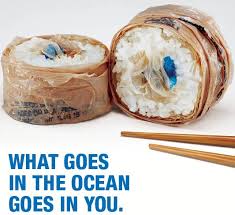The issue of plastic in the ocean is one that many of you are no doubt aware of, given that the ‘island of plastic’ floating in the Pacific was discovered as long ago as 1997. However, in those intervening 17 years the situation has significantly worsened as a blog entitled A Sea Full of Trash by Morgana Matus for Fix.com reveals.
As Morgana makes clear, some steps – although far too few – are being made to stop plastics entering our waterways, but the equally difficult issue is how to tackle the problem of the plastic already in our seas. The debris is found many fathoms deep, throughout our oceans, with unknown effects as this article in National Geographic makes clear, but what is undeniable is the sheer amount of it – 13,000 pieces of plastic litter in every single square kilometer of ocean globally. This plastic eventually breaks down into tiny microscopic particles that is then eaten by the marine life, entering the food chain and thereby being passed on to humans. And, it’s not just our seas that are ridden with this Plastic Poison, it’s reaching up into our rivers, too.
What can we do? Firstly, stop buying new plastic:
- Reuse your flimsy bags – when you run out (if you ever do), start using cloth bags instead. One that supports a marine charity like Global Ocean would be even better.
- Don’t buy bottled water – get a reusable steel bottle like these from Surfers Against Sewage.
- Some facial scrubs have microscopic plastic beads in them, that are having a devastating effect on fish in rivers and seas, so avoid these. The Good Scrub Guide tells you which products don’t contain them.
- Buy recycled products, choose reusable over throwaway, recycle as much of your waste as possible and refuse unnecessary plastics at shops and supermarkets. If you need advice on recycling check out this guide.
Secondly, support our oceans and the organisations trying to save them. I’ve already mentioned a few – Global Ocean, Surfers Against Sewage and the Marine Conservation Society, but there others you can support either financially or by volunteering for them. A quick internet search reveals a whole host of them – sadly demonstrating the huge need for their work. Organising a beach or riverside clear-up is a good start as that help prevent plastic getting into our waterways in the first place.
Thirdly, put pressure on our politicians, businesses and community leaders to tackle this problem.
- Write/email/tweet your MP.
- Tell the shops you buy from that you don’t want them to use plastics, ask them what they’re doing with their rubbish, demand they use recycled plastic wherever possible.
- Contact your local council and see how much of the rubbish they collect is being recycled, do they buy recycled, and if it’s not good enough, pressure them to do more.
- Make groups and bodies you’re involved in, such as schools, colleges, universities, youth organisations, sporting bodies, charities and faith groups, aware just how poisonous plastic is
- Talk about this with everyone you know. Share the issue. Alert others to the problem.
- You don’t have to do all these actions, just pick one, make a start.
As Anne Frank says: ‘how wonderful it is that nobody need wait a single moment before starting to improve the world’.
#DoOneThingToday – start saving our seas.

